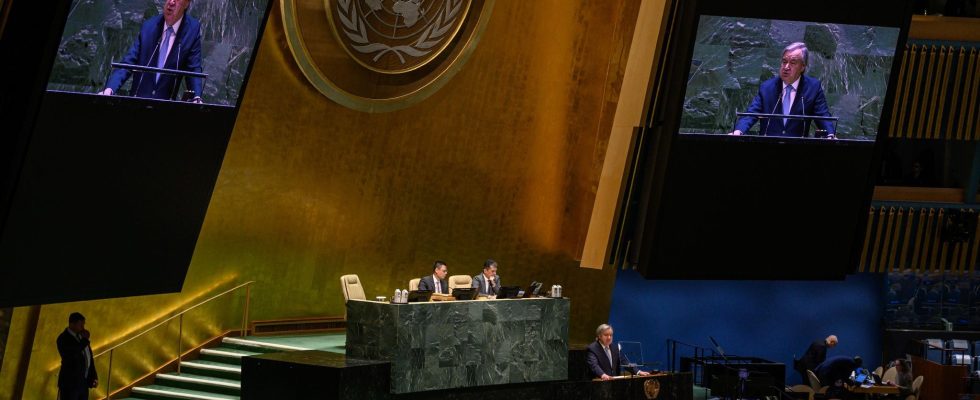Two weeks before the most important COP since the Paris Agreement, humanity continues to go “off-road”: according to the UN, countries’ current commitments lead to a 2% reduction in emissions between 2019 and 2030, at instead of the 43% recommended to limit warming to 1.5°C. This conclusion, established by a report published this Tuesday, November 14, shows that governments must move from “small steps” to “giant leaps at COP28”, declared Simon Stiell, executive secretary of the United Nations Framework Convention on climate change (UNCAC).
This 28th United Nations climate conference, from November 30 to December 12 in Dubai, “must be a real turning point” because “we are off track” and “every fraction of a degree counts”, urged Simon Stiell in a video message . “The report published today clearly shows that every fraction of a degree counts, but that we are off track,” added the UN leader from the island of Grenada.
Need for a “climate ambition supernova”
“Inch by centimeter progress will not do the trick,” added UN chief Antonio Guterres in a statement. “The time has come for a supernova of climate ambition in every country, city, sector,” he added. The new report is the annual summary of the latest emissions reduction commitments – called “nationally determined contribution” (NDC) – made by the 195 signatories of the 2015 Paris agreement, of which COP28 must establish the first official assessment and, if possible, make the first corrections.
The report takes into account 20 new NDCs (unpublished or revised) submitted over the past year (Mexico, Turkey, Egypt, UAE, Norway, etc.) but not the update of the 27 European countries or Brazil, submitted since October.
Peak by 2025
The 2015 Paris Agreement sets the objective of limiting average global warming to “well below 2°C compared to pre-industrial levels”, when humanity began to exploit on a large scale the fossil fuels responsible for greenhouse gas emissions, “and if possible at 1.5°C”. But to have a 50% chance of containing global climate warming to 1.5°C, global emissions must fall by 43% by 2030, compared to 2019 levels, according to the latest IPCC report, experts mandated by the UN.
These emissions must reach a peak by 2025, not only to hope to limit warming to 1.5°C but also to 2°C or 2.5°C, according to the IPCC. In its latest report, the IPCC estimated the quantity of greenhouse gases remaining to be emitted to reach 1.5°C of global warming, or approximately 12 years of current global emissions, at 500 Gigatonnes (Gt) of CO2 equivalent.
Still no drop in emissions
According to a recent reassessment by scientists, this carbon budget would ultimately only be half, 250 Gt of CO2e, or around six years. The report released Tuesday, “consistent with last year’s findings, indicates that while emissions no longer increase after 2030 compared to 2019 levels, they still do not show the rapid decline that science says is necessary in this decade “, underlines the UN Climate.
In September, the first technical assessment of the Paris agreement, carried out under the aegis of the UN Climate to prepare the assessment negotiated by the States at COP28, underlined the need to move away from fossil fuels, to accelerate in renewables and to unlock financial mechanisms for transition and development.
This assessment of the Paris agreement at COP28 will be an important prerequisite for the mandatory revision of the NDCs by 2025 and the COP30 planned in Brazil. At COP26 in 2021 in Glasgow, signatories to the agreement committed to reviewing the NDCs annually – instead of every five years – but only a minority of them have done so since.
